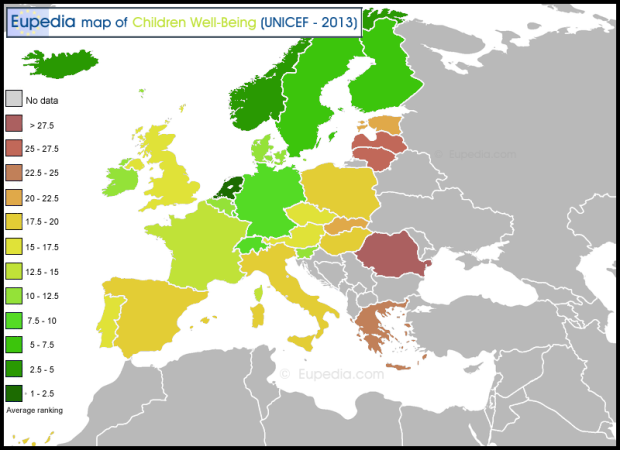Seven years ago I analysed the UNICEF report on children well-being in rich countries. Here is a new report for 2013, which has eight additional countries.
The Netherlands still tops the ranking, followed by Scandinavian countries like before, except Denmark which fell from 3rd to 11th position. Germany, Switzerland, Luxembourg, Belgium and Ireland remain toward in the upper tier.
The decline in children well-being in Denmark is explained mostly by a severe drop in health and safety (4th => 23th), and a more moderate one in material well-being (4th => 12th). Education remains stable and there has even been an improvement in behaviours and risks.
The low score for health and safety can be attributed to one of the lowest immunization rate among Danish children (88% against an average of 95% for other countries). The decline in material well-being is attributable to a poor score in 'child poverty gap' (gap between the poverty line and the median income of those below the poverty line). These don't seem to be very serious factors though.
The USA and the UK were dead last in the 2006 report. Things have actually got worse for the USA, which now ranks 26th out of 29 countries, just behind Greece, and only doing better than Lithuania, Latvia and Romania.
On the other hand, the situation in Britain has improved, passing from 21st out of 21 to 16th out of the 29. All dimensions improved except education, which has worsened.
Spain, which had performed well in 2006 (5th position) has fallen to the 19th place in the ranking, with a clear deterioration of behaviours & risks (5th => 20th), education (15th => 26th) and material well-being (12th => 24th).
Unsurprisingly the financial crisis has also taken its toll on Greece, which drops from 13th to 25th, with behaviours & risks (8th => 25th) most severely affected.
Behaviours & risks include being overweight, not eating breakfast and fruit, not doing enough exercise, high teenage fertility rate, teenage smoking, alcohol, cannabis, children exposure to violence, fighting and bullying.
Greece has experienced a considerable increase in overweight teenagers, jumping from 16% in 2006 to 21% in 2013. Greece also ranks low for exercise and eating breakfast.
I have made a map to show the average ranking of each country.

The Netherlands still tops the ranking, followed by Scandinavian countries like before, except Denmark which fell from 3rd to 11th position. Germany, Switzerland, Luxembourg, Belgium and Ireland remain toward in the upper tier.
The decline in children well-being in Denmark is explained mostly by a severe drop in health and safety (4th => 23th), and a more moderate one in material well-being (4th => 12th). Education remains stable and there has even been an improvement in behaviours and risks.
The low score for health and safety can be attributed to one of the lowest immunization rate among Danish children (88% against an average of 95% for other countries). The decline in material well-being is attributable to a poor score in 'child poverty gap' (gap between the poverty line and the median income of those below the poverty line). These don't seem to be very serious factors though.
The USA and the UK were dead last in the 2006 report. Things have actually got worse for the USA, which now ranks 26th out of 29 countries, just behind Greece, and only doing better than Lithuania, Latvia and Romania.
On the other hand, the situation in Britain has improved, passing from 21st out of 21 to 16th out of the 29. All dimensions improved except education, which has worsened.
Spain, which had performed well in 2006 (5th position) has fallen to the 19th place in the ranking, with a clear deterioration of behaviours & risks (5th => 20th), education (15th => 26th) and material well-being (12th => 24th).
Unsurprisingly the financial crisis has also taken its toll on Greece, which drops from 13th to 25th, with behaviours & risks (8th => 25th) most severely affected.
Behaviours & risks include being overweight, not eating breakfast and fruit, not doing enough exercise, high teenage fertility rate, teenage smoking, alcohol, cannabis, children exposure to violence, fighting and bullying.
Greece has experienced a considerable increase in overweight teenagers, jumping from 16% in 2006 to 21% in 2013. Greece also ranks low for exercise and eating breakfast.
I have made a map to show the average ranking of each country.



